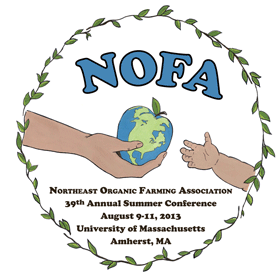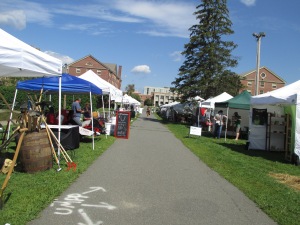The morning of August 10th arrived bright and, well, early. It was, after all, a Saturday, and most of the Smithies I know (even those of us who genuinely enjoy getting up early – yes, 9 a.m. spin class, I’m looking at you) are averse to getting up before 7 a.m. on our blessed weekends. But this was no ordinary Saturday; I needed to make my way over to UMASS by 8 a.m. in order to register for the social event of the season: the 2013 NOFA Summer Conference.
And farmers, as you might expect, get to work early.
It was just a few minutes before 8 a.m. by the time I arrived at the Hagis Mall bus stop and made a beeline for the nearest campus map. Luckily, I was soon in good company; a fellow (flannel-clad) passenger was also NOFA-bound, so together we managed to find our way through the huge concrete structures to the registration tents at the Northwest tip of campus.
There we were given our very own NOFA name-tags and workshop booklets. And what variety they had: everything from “GMO Health Dangers & Legislative Initiatives in N.E.” to “Growing Figs in Cold Climates” to “Goat-sniffing: Holistic Herd Management”. There were medical talks on how to care for all of the aches and pains accumulated though farming, foraging walks that pointed out useful wild edibles and fibers, and quite a bit on the business and marketing side of Ag, along the lines of “The Efficient Farm Office” .
How difficult to chose between them all!
Would I miss out by going to a talk with a good presenter versus a more academic lecture. Could I really live with myself if I went exclusively to workshops on goats? Or Fungi?
So instead of traipsing over to the “Wild World of Mushrooms”, I decided that I needed to attend some “school-y” talks that focused on, say, irrigation methods in New England clay soil, and would then reward myself with something silly like “Cheese Tasting and Describing”.
I pegged down “Crop/Cover Crop Rotations and Tillage Reduction” for my 8AM workshop and sped my way down to the Campus Center, already a few minutes late. Most of the workshops were in this vast brutalist building, but a smaller conference was also under way for teens and yet another for kids (involving quite a few more live plants and copious amounts of dirt). There were also some location-specific events that took place on local farms, in the livestock pens of the UMASS farm, or (as was the case of “Homemade Raw Milk Products”), in the UMASS Worcester Dining Hall.
This first panel was led by a relatively new farmer, who had built her farm in the last few years. She was educated, flannel-wearing, and enthralled with the romance of the farm – part of the new wave of young, middle-class farmers who seemed a marked contrast from the older I’ve-been-hoeing-since-Nixon-was-still-a-respected-politician types.
We got some great info from the presenter – which cover crops to pair with your veggies; good combinations of mowing, tarping, and cropping to reduce tillage; even flame-torching to kill weeds – but I felt myself get a bit itchy. Thankfully, one thing you immediately notice about a NOFA conference is the informality of the events. People just sort of throw in questions, many taking notes in three-ring notebooks, add comments from their own experience, and walk in and out of the talks with some regularity. So I snuck out of the back door to have a look at something goat-related.
“Grazing Basics” detailed all of the management fundamentals of intensive grazing and was led by the knowledgeable Mike Ghia, who is a former Grazing Technical Assistant with UVM. I sat enthralled for the next hour, taking notes on the different strategies of grazing ruminants and talking with the highly-experienced sheep herder next to me, who had quite a lot of amusing things to say about the presentation. She was perhaps 60 years old, with the no-nonsense competence and worn generosity that immediately made you comfortable, and she was willing to answer all of my questions (even the stupid ones) after the workshop ended. So it was with NOFA: again and again I came into contact with the most extraordinary and wonderful people and they all seemed willing to share freely their knowledge and expertise. Farming is awfully hard work, and nobody appreciates this more than the dedicated souls who get out of bed in the dark to do it.
My next workshop – on Green Burials and the natural death movement – was just as fascinating. But getting the opportunity to chat with people from all over the region who do completely different types of work was extraordinary. That, even more than the amazing things I learned at the workshops, that was the best thing about my time at NOFA.
Before I headed home, I got a few minutes to peruse the other tents, both educational and business. I saw farmers’ markets, information from the Natural Resources Conservation Service, agricultural and gardening books for sale, a poultry farm with fresh eggs, wooden bowls and pots, a company advertising their cow fences, and more than a few Agricultural Technology companies. I also was able to snag a few free samples of exquisite gluten-free pumpkin bread from a local baker, and the coffee was plentiful.
But my time had come. The PVTA was calling, and I slowly wound my way through the summer college construction back to the bus stop; my day of agricultural education had come to a close. It would likely be a long time before I got the chance to schmooze with strangers about the best kind of chicken-wire and alternatives to rototilling in small plot farming.
Then again, January’s not such a long way off.
-Amelia Burke, ’15
Amelia hopes to graduate as a Middle Eastern Studies Major, Environmental Science and Policy minor, and Sustainable Food Concentrator (that is, if she resists the urge to run away to a goat farm long enough.) This was her second NOFA conference; she attended the NOFA winter conference this past January with Professor Paul Wetzel and a fellow Sustainable Food Concentrator. She will be spending the coming year working in agriculture in the West Bank. After graduation, she hopes to do field research on both traditional pastoralism and agriculture in arid regions of the Middle East, and the interplay between nationalism and the environmentalist movement in Palestine.



